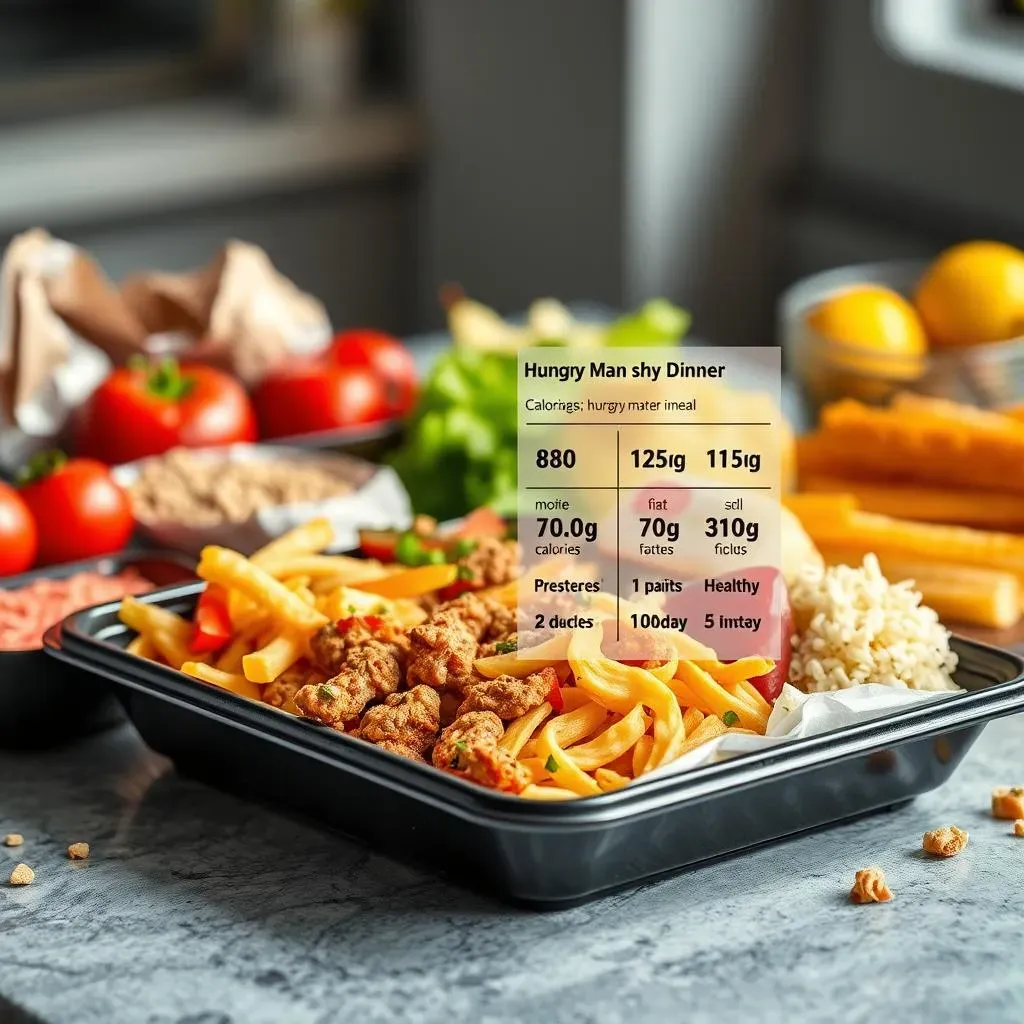Table of Contents
Ever stared into the freezer aisle, wondering if those hefty Hungry Man dinners are a quick fix or a health hazard? You're not alone. Many of us, juggling busy schedules, find the convenience of frozen meals tempting. But, when it comes to something like a Hungry Man dinner, it's crucial to ask: are hungry man dinners bad for you? This article will break down exactly what's inside those trays, moving past the flashy packaging and getting into the nitty-gritty of their nutritional content. We'll explore the hidden dangers of high sodium and unhealthy fats, examine what regular consumption could mean for your health, and ultimately, help you decide if these meals fit into a balanced lifestyle. We'll also look at healthier options, because let's be real, sometimes you just need something quick. So, stick around and let's get to the bottom of this frozen food mystery.
Nutritional Breakdown of Hungry Man Dinners

Nutritional Breakdown of Hungry Man Dinners
Calorie Counts and Serving Sizes
let's talk numbers. When you grab a Hungry Man dinner, you're not just picking up a meal; you're grabbing a serious calorie bomb. These things can easily pack 600, 700, or even 800 calories per serving. And here's the kicker: that's just for one tray! Now, compare that to what most of us should be eating for a meal, and it's pretty clear that these are designed to be, well, "man-sized." But, if you're not actively burning off those calories, it's a fast track to packing on the pounds. And, let's face it, who has the time to do that these days?
The problem isn't just the calories themselves, it's the fact that they're often not the "good" kind of calories. We're talking about a lot of refined carbohydrates and not a lot of the fiber that would help you feel full and satisfied. It's like eating a whole bag of chips versus a balanced plate of food – the calories might be similar, but the effect on your body is totally different.
Macronutrient Imbalance
Let's peek at the macronutrients, the big three: carbs, fats, and proteins. Hungry Man dinners tend to be heavy on the carbs, especially the simple kind that spike your blood sugar and leave you crashing later. Then, there are the fats. While some fat is necessary, a lot of the fat in these meals is the saturated and trans kind, which aren't doing your heart any favors. The protein content is often there, but it might be overshadowed by the higher amounts of carbs and fats. It's all about balance, and these meals? They're often way off-kilter.
Think of it like this: if your body is a car, it needs the right fuel to run smoothly. A Hungry Man dinner is like filling up with low-grade gasoline – it might get you going, but it's not going to be good for the engine long-term. It's that imbalance that's the real issue, not just the calories.
Macronutrient | Typical Hungry Man Dinner | Ideal Balanced Meal |
|---|---|---|
Carbohydrates | High (often refined) | Moderate (complex carbs) |
Fats | High (saturated and trans) | Moderate (healthy fats) |
Protein | Moderate | Adequate (lean proteins) |
Vitamins, Minerals, and Fiber: The Missing Pieces
let's talk about what's *not* in these meals: the good stuff! You'd be hard-pressed to find a significant amount of vitamins and minerals in a typical Hungry Man dinner. It's not that they're completely absent, but they're often overshadowed by the high levels of sodium and fats. And fiber? Forget about it. Fiber is like the broom that sweeps your digestive system clean, and it also helps you feel full. Without it, you're not only missing out on important health benefits, but you're also more likely to overeat because you won't feel satisfied.
It's like building a house with only bricks and no insulation or wiring. Sure, it might stand, but it's not going to be very functional or comfortable. These meals often skip the vital nutrients our bodies need to thrive, making them a less-than-ideal choice for regular consumption. It's not just about what's there; it's about what's missing.
The Impact of Sodium and Fats in Hungry Man Meals

The Impact of Sodium and Fats in Hungry Man Meals
Sodium Overload: The Silent Killer
Alright, let's talk about salt – or rather, sodium. Hungry Man dinners are notorious for their sky-high sodium content. We're not talking a little sprinkle here; we're talking levels that can send your blood pressure through the roof. The average adult should aim for less than 2,300 milligrams of sodium per day, but many Hungry Man meals can pack well over half of that in just one serving. That’s a lot of salt, and it's not just about taste. Over time, this much sodium can seriously mess with your heart and blood vessels, increasing your risk of hypertension, stroke, and other cardiovascular problems. It's like constantly running your engine on high – eventually, it's going to break down.
It's sneaky too, because you might not even realize how much sodium you're consuming. It's not just the salt shaker; it's often hidden in processed foods like these. And here's a fun fact: sodium makes you retain water, which can lead to that bloated, uncomfortable feeling. So, if you're feeling puffy after a Hungry Man meal, now you know why. It's not just about the calories; it’s about the hidden dangers lurking in the salt.
The Fat Factor: Saturated and Trans Fats
Now, let's move on to fats. Not all fats are created equal, and Hungry Man dinners tend to be loaded with the bad ones: saturated and trans fats. Saturated fats, found in things like animal products and some oils, can raise your "bad" cholesterol levels, increasing your risk of heart disease. Trans fats, often created during food processing, are even worse – they not only raise bad cholesterol but also lower the good kind. These fats can clog your arteries like grease in a pipe, making it harder for your heart to pump blood. It's like putting the wrong kind of oil in your car – it might run for a while, but it's not going to be good for its long-term health.
The problem is, these fats often add to the "comfort food" feel of these meals, making them taste good but they're doing no favors to your health. It’s a double whammy of unhealthy fats and high sodium that, when combined, can make these meals a real threat to your cardiovascular system. It's not just about feeling full; it's about making choices that support your well-being. Remember, what you put in your body is what you get out of it.
Type of Fat | Impact on Health | Typical Source |
|---|---|---|
Saturated Fats | Raises "bad" cholesterol, increases heart disease risk | Animal products, some oils |
Trans Fats | Raises "bad" cholesterol, lowers "good" cholesterol, increases heart disease risk | Processed foods, some fried foods |
Unsaturated Fats | Can improve cholesterol levels, beneficial for heart health | Avocados, nuts, olive oil |
Health Concerns Related to Regular Consumption of Hungry Man Dinners

Health Concerns Related to Regular Consumption of Hungry Man Dinners
Weight Gain and Obesity Risks
so what happens if you start making Hungry Man dinners a regular thing? Well, first off, let's talk about weight. Remember those high calorie counts we discussed? If you're consistently eating more calories than you're burning, the scale is going to start creeping up. And it’s not just a few pounds here and there; regular consumption of these calorie-dense meals can lead to significant weight gain and even obesity over time. It's like constantly overfilling a bucket – eventually, it's going to overflow. Plus, the lack of fiber and nutrients means you're not feeling full, so you might be tempted to reach for more snacks, creating a vicious cycle.
Think of it this way: your body is designed to operate on a certain amount of fuel. If you're giving it way too much, it has to store the excess somewhere, and that usually shows up as extra weight. And obesity isn't just about how you look; it's linked to a whole host of other health issues, like diabetes, heart disease, and even some types of cancer. It’s like setting off a domino effect of health problems, and it all starts with the choices we make about what we eat.
Cardiovascular Issues and Hypertension
Now, let's zoom in on your heart. All that sodium and those unhealthy fats we talked about? They're not just making you feel bloated; they're also putting a serious strain on your cardiovascular system. The high sodium content can lead to hypertension, or high blood pressure, which is like having a constant pressure on your arteries. Over time, this can damage your blood vessels and increase your risk of heart attacks and strokes. It's like constantly inflating a tire past its recommended pressure – eventually, it’s going to burst. And the saturated and trans fats? They're contributing to plaque buildup in your arteries, making it harder for your heart to pump blood. It’s like having a clogged drain; everything backs up and doesn’t flow smoothly.
So, if you're making Hungry Man dinners a regular part of your diet, you're essentially gambling with your heart health. It’s not just about feeling good now; it’s about taking care of your body for the long haul. And remember, heart disease is one of the leading causes of death, so it’s not something to take lightly. It’s about making choices that support your heart, not choices that are actively harming it.
Increased Risk of Type 2 Diabetes
And here’s another thing to consider: type 2 diabetes. Those high amounts of refined carbohydrates in Hungry Man dinners can cause spikes in your blood sugar. Over time, this can lead to insulin resistance, where your body doesn't respond properly to insulin, the hormone that regulates blood sugar. This can increase your risk of developing type 2 diabetes, a condition that can lead to a whole host of complications, like nerve damage, kidney problems, and vision loss. It’s like constantly revving your car’s engine – eventually, the parts are going to wear out.
It's not just about the sugar in your soda or sweets; it's about the hidden sugars in processed foods too. And the lack of fiber in these meals means that your body is absorbing those sugars more quickly, causing those blood sugar spikes. So, if you're making Hungry Man dinners a regular part of your diet, you're not just increasing your risk of weight gain and heart problems; you're also putting yourself at a higher risk of developing type 2 diabetes. It’s about making choices that keep your body’s systems running smoothly, not choices that are throwing them out of whack.
“The food you eat can be either the safest and most powerful form of medicine or the slowest form of poison.” - Ann Wigmore
Digestive Issues and Poor Gut Health
Finally, let's talk about your gut. Remember how we mentioned the lack of fiber in these meals? Well, that's not doing your digestive system any favors. Fiber helps keep things moving smoothly, and without it, you might experience digestive issues like constipation and bloating. Plus, a diet low in fiber can also affect your gut microbiome, the community of bacteria that live in your digestive tract. A healthy gut is crucial for overall health, and a lack of fiber can disrupt this delicate balance. It's like having a garden without the proper soil; things just aren't going to grow well.
So, if you're making Hungry Man dinners a regular part of your diet, you're not just missing out on essential nutrients; you're also potentially disrupting your digestive system and your gut health. And remember, a healthy gut is linked to everything from your immune system to your mood, so it’s not something to take lightly. It’s about making choices that support a healthy digestive system, not choices that are causing it to struggle.
Health Concern | Potential Impact of Regular Consumption |
|---|---|
Weight Gain and Obesity | Increased risk of weight gain, obesity, and related health issues |
Cardiovascular Issues | Elevated risk of high blood pressure, heart attack, and stroke |
Type 2 Diabetes | Increased risk of developing type 2 diabetes and insulin resistance |
Digestive Issues | Digestive problems, constipation, and poor gut health |
Balancing Convenience and Health: Are Hungry Man Dinners a Good Choice?

Balancing Convenience and Health: Are Hungry Man Dinners a Good Choice?
so we've laid out the not-so-pretty truth about Hungry Man dinners. They're convenient, sure, but they're also loaded with things that can mess with your health. The big question now is: can convenience and health ever really coexist when it comes to these meals? The short answer is, it's complicated. On one hand, these dinners are a quick and easy option for those days when you're too tired to cook. On the other hand, they're far from the ideal choice if you're trying to maintain a balanced and healthy diet. It's like trying to fit a square peg into a round hole – it's possible, but it's not going to be pretty. So, what's the middle ground?
Well, it's not about completely banning them from your life, unless you're strictly on a path to peak health. It's more about being smart about how and when you eat them. Think of it like this: if you’re going on a long road trip, you wouldn’t fill your car with the cheapest, worst fuel you could find, right? You’d want something that'll keep your car running well and get you to your destination. The same should go for your body. Moderation and mindful choices are the name of the game here. So, how do we make these meals work, or at least, not completely sabotage our well-being?
Aspect | Consideration |
|---|---|
Frequency | How often do you eat Hungry Man dinners? Make it a once-in-a-while thing, not a regular habit. |
Portion Control | Are you eating the entire meal? Maybe try eating half and adding some healthier sides. |
Nutrient Supplementation | Are you balancing this meal with other fruits, vegetables, and whole grains throughout the day? |
First off, let's talk about portion sizes. These meals are designed to be "man-sized," which often means they're way more than what most people need in one sitting. Consider eating half of the meal and saving the rest for later or better yet, add some healthier foods to bulk it up. This alone can cut down the calories, sodium, and unhealthy fats. Also, think about what you're pairing with these meals. If you're having a Hungry Man dinner, maybe skip the sugary drink and opt for water instead. Or, add a side salad to get some extra fiber and vitamins. It's like adding a healthy dose of veggies to a not-so-healthy burger – it's not perfect, but it's a step in the right direction.
Next, and this is crucial, pay attention to the nutritional labels. Don't just grab the first one you see. Take a minute to see how much sodium, fat, and sugar are in each meal. This can help you make smarter choices. And remember, it's about progress, not perfection. You don't have to completely overhaul your diet overnight. Small changes can make a big difference over time. It's like taking small steps to run a marathon – you don't start with the full 26.2 miles, you build up to it. So, start by making a few conscious choices, and you'll be on your way to a healthier you.
"Let food be thy medicine and medicine be thy food." - Hippocrates
So, are Hungry Man dinners a good choice? Well, they're definitely not the best choice, but they don't have to be the worst either. It all comes down to how you approach them. If you're eating them every day, without considering portion sizes or other nutritional choices, then yeah, they're probably not doing your body any favors. But if you're using them sparingly, making smart choices about portion sizes and what you're pairing with them, and balancing it all out with other healthy meals, then you can probably get away with the occasional indulgence. It’s about finding a balance that works for you and your lifestyle. It's not about deprivation; it's about making informed choices that support your health and well-being. And remember, you're in charge of your health journey. So, choose wisely.
Wrapping Up: Making Informed Choices About Hungry Man Dinners
So, are Hungry Man dinners bad for you? The answer, like most things, isn’t a simple yes or no. These meals offer undeniable convenience, but their high sodium, unhealthy fats, and lack of essential nutrients raise serious health concerns. Regular consumption could contribute to weight gain, high blood pressure, and other health issues. While they might be okay occasionally when you're in a pinch, it’s crucial to prioritize a balanced diet filled with fresh, whole foods. Be mindful of portion sizes, read those nutrition labels, and don't be afraid to explore healthier quick meal options. Your body will thank you for making informed choices, even when time is tight.